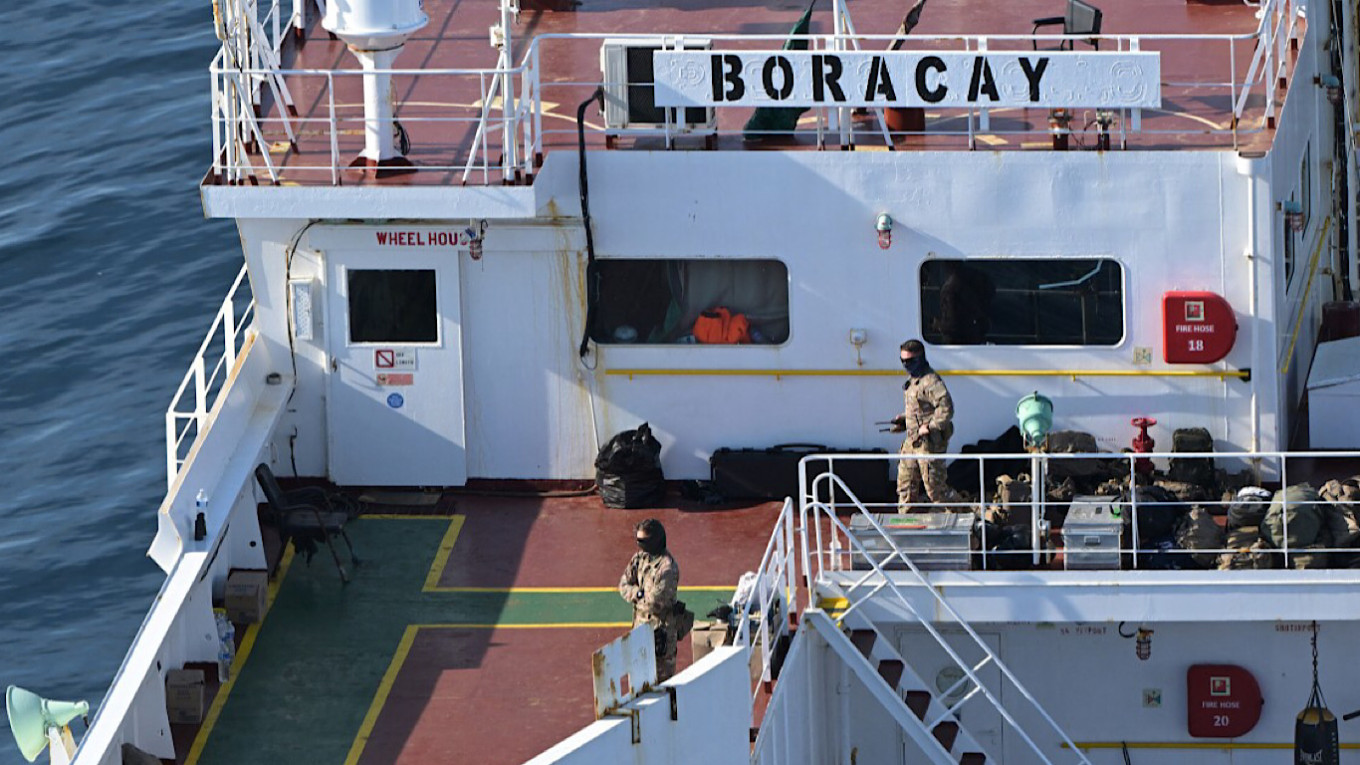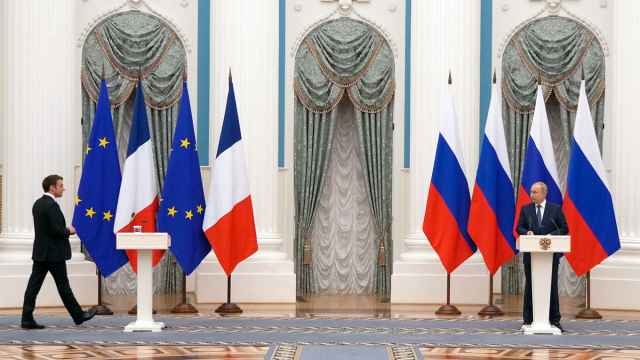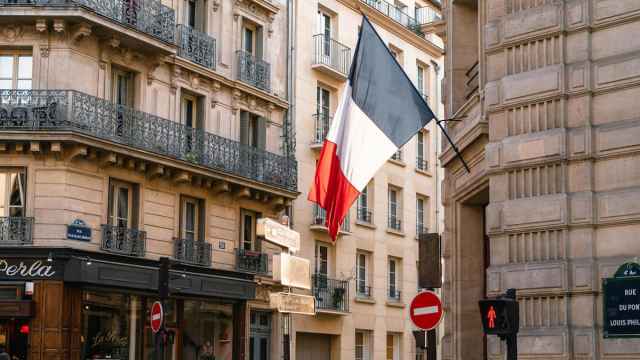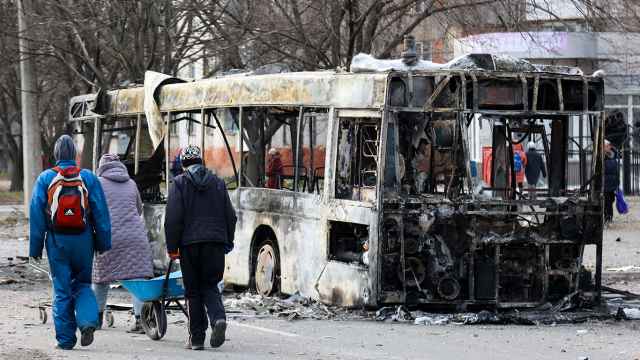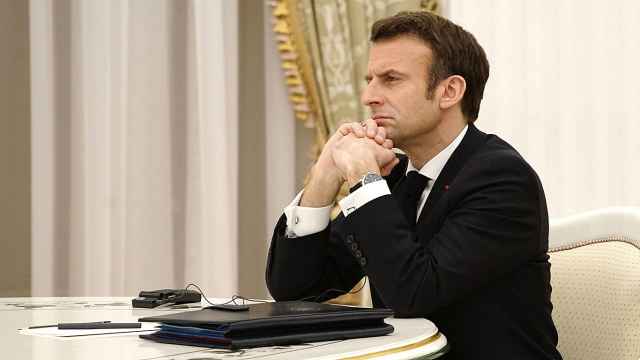A French court is to try the Chinese captain of a tanker from Russia's "shadow fleet" early next year after it was intercepted off France, prosecutors said Thursday, in a move seen as a message to Moscow over its efforts to skirt Western oil sanctions.
The French navy on Saturday stopped the Boracay, a vessel claiming to be flagged in Benin and blacklisted by the European Union for being part of Russia's sanction-busting "shadow fleet" of aging oil tankers, according to the public prosecutor's office in the northwestern city of Brest.
The vessel was investigated over inconsistencies in where the tanker was officially registered while it was carrying a "large cargo of oil" from Russia to India, it added.
The captain and first mate of the Boracay were detained on Tuesday over refusing to provide evidence of nationality or cooperate with French authorities, the prosecutor's office said.
The captain has been told to appear in court in February, but the first mate has been released, it said.
It was not immediately clear if the captain would be released under certain conditions or if the Russia-linked ship could go on its way.
Shipping data analyzed by AFP has shown it was positioned off Denmark during mysterious drone flights over the country last month, including over military sites, that prompted brief closures at several airports.
French President Emmanuel Macron on Thursday urged Europe to "increase the pressure" on Russia's shadow fleet and follow his country's lead in detaining vessels used to fuel Moscow's war in Ukraine.
"You kill the business model by detaining, even for days or weeks, these vessels and forcing them to organize themselves differently," Macron told a leaders' gathering in Denmark.
He said on Wednesday France was probing the ship for "serious offenses," but stopped short of confirming reports of a connection to the Denmark drone flights.
French military personnel remained on board the tanker on Thursday, another military source who spoke on the condition of anonymity said.
'Navy commandos'
French Prime Minister Sebastien Lecornu on X thanked "navy commandos and the crews of the French navy who intervened this weekend aboard the tanker belonging to the Russian ghost fleet."
Estimated to include up to 1,000 ships, the shadow fleet is thought to represent "tens of billions of euros of Russia's budget" and make up "40% of the Russian war effort," according to Macron.
The vessels — which fly flags of convenience, have opaque ownership and often turn their transponders off — enable Moscow to keep exporting its crude oil for much-needed revenue despite curbs on exports.
"The investigation carried out by the French Navy concluded that it had no flag," said the Brest public prosecutor.
The first military source told AFP that Russian ships were common off the French coast.
"Every day between 10 and 15 vessels from the shadow fleet sail off the coast of Brest," the source said.
The Boracay — which has also been named the Pushpa or the Kiwala — was positioned off Denmark from Sept. 22-25, according to data from the maritime website VesselFinder analyzed by AFP.
According to the specialist website The Maritime Executive, the 244-meter (801-foot) vessel is suspected of being involved in the drone flights over Denmark.
The publication said the tanker and other ships could have been used either as launch platforms or as decoys.
The tanker left the Russian port of Primorsk outside St. Petersburg on Sept. 20, shipping data showed.
Data from the Marine Traffic tracker showed the tanker was scheduled to arrive in Vadinar in northwestern India on Oct. 20.
A Message from The Moscow Times:
Dear readers,
We are facing unprecedented challenges. Russia's Prosecutor General's Office has designated The Moscow Times as an "undesirable" organization, criminalizing our work and putting our staff at risk of prosecution. This follows our earlier unjust labeling as a "foreign agent."
These actions are direct attempts to silence independent journalism in Russia. The authorities claim our work "discredits the decisions of the Russian leadership." We see things differently: we strive to provide accurate, unbiased reporting on Russia.
We, the journalists of The Moscow Times, refuse to be silenced. But to continue our work, we need your help.
Your support, no matter how small, makes a world of difference. If you can, please support us monthly starting from just $2. It's quick to set up, and every contribution makes a significant impact.
By supporting The Moscow Times, you're defending open, independent journalism in the face of repression. Thank you for standing with us.
Remind me later.


